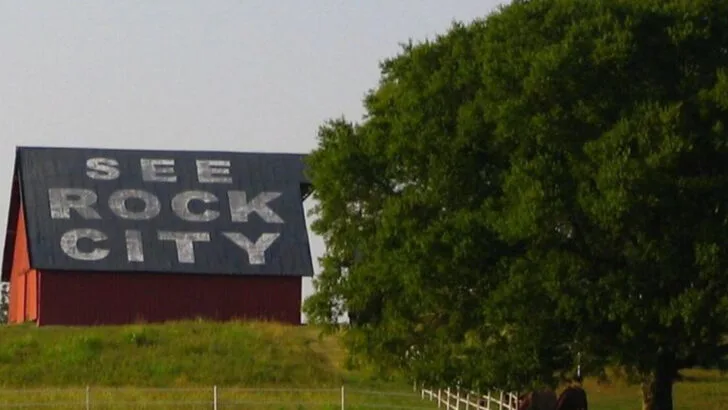Tennessee is home to a wealth of historical barns that offer more than just rural charm.
These structures, steeped in history, provide a glimpse into bygone eras, showcasing architectural ingenuity and cultural heritage.
Here are six antique barns that could easily be mistaken for history museums.
See Rock City Barn – Crossville
Perched along the roadside in Crossville, the See Rock City barn stands as a testament to mid-20th-century advertising. Painted with the iconic slogan, it beckons travelers with nostalgic charm. This barn is not just a structure; it’s a piece of Americana.
The bold white letters against the red backdrop capture the essence of a time when road trips were a family affair. It reflects a period when simple marketing techniques had lasting impacts.
Preserved with care, this barn is a symbol of heritage, connecting modern visitors to the past era of travel and exploration.
John Messer Barn – Sevier County
Tucked away in Sevier County, the John Messer Barn is a rare gem of 19th-century mountain farm architecture. This double-cantilever log barn, built in 1875, showcases Appalachian craftsmanship at its finest.
With its distinctive overhanging lofts, the barn reflects a bygone agricultural practice, essential for protecting hay from the elements. The design is both functional and aesthetically pleasing.
Standing amid the Smoky Mountains, this barn is a historical artifact, offering insights into the lifestyle and ingenuity of early rural settlers. Its preservation is a tribute to the region’s rich cultural legacy.
Bradford Rymer Barn – Meigs County
In Meigs County, the Bradford Rymer Barn stands out with its unique stone construction, a rarity from the early 20th century. Built around 1930, this two-story edifice marks a shift towards farm modernization.
Its sturdy stone walls and spacious design were revolutionary, moving away from traditional wooden structures. It reveals the evolving needs and resources of the time.
This barn not only served agricultural purposes but also represented progress and innovation. Its enduring presence tells a story of resilience and adaptation in the face of changing agricultural practices.
Cantilever Barn – East Tennessee
East Tennessee is home to the distinct cantilever barn, a symbol of Appalachian building traditions. With its overhanging lofts resting atop sturdy log cribs, this barn design is both ingenious and picturesque.
The architectural style served practical purposes, providing shelter for livestock below while keeping hay dry above. Its construction required skillful craftsmanship, showcasing local ingenuity.
These barns are a visual reminder of regional heritage, bridging the past with the present. Each cantilever barn tells a story of adaptation to the mountainous terrain and historical farming practices.
Transverse Crib Barn – Middle Tennessee
In Middle Tennessee, the transverse crib barn is a testament to practical farming methods. With its central aisle designed to accommodate wagons and livestock, this barn demonstrates thoughtful adaptation.
The design allowed for efficient storage and easy access to hay and equipment, crucial for a working farm. Its sturdy wooden construction is both functional and enduring.
These barns reflect the evolution of agricultural life, blending necessity with craftsmanship. Each structure embodies a story of rural ingenuity, standing as a symbol of the region’s agricultural history and development.
Harlinsdale Farm Barns – Williamson County
Harlinsdale Farm in Williamson County is legendary for its association with the Tennessee Walking Horse. The barns here are more than just shelters; they are part of an equestrian legacy.
The farm’s historical significance lies in its contribution to horse breeding and agriculture. The barns, with their classic design, offer a glimpse into the state’s rich equestrian culture.
Visitors can feel the history as they explore these structures, understanding the deep connection between the land and the celebrated Tennessee Walking Horse. They remain integral to the heritage of the region.

